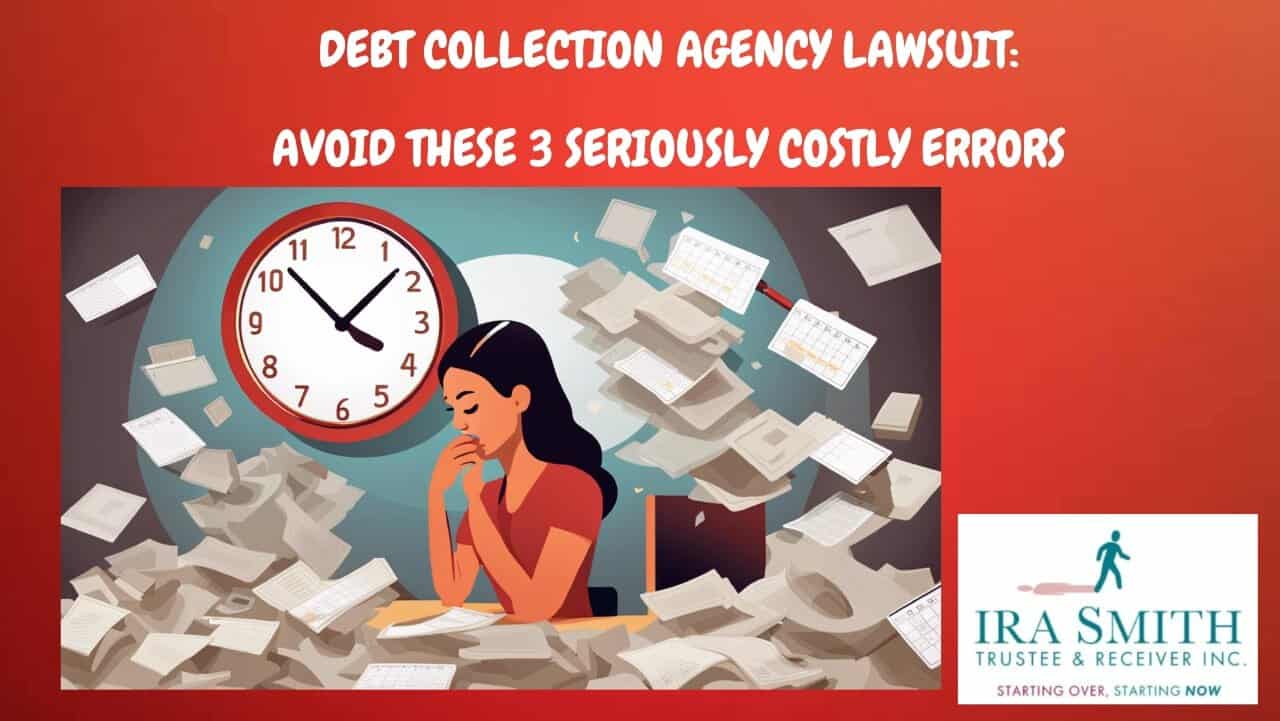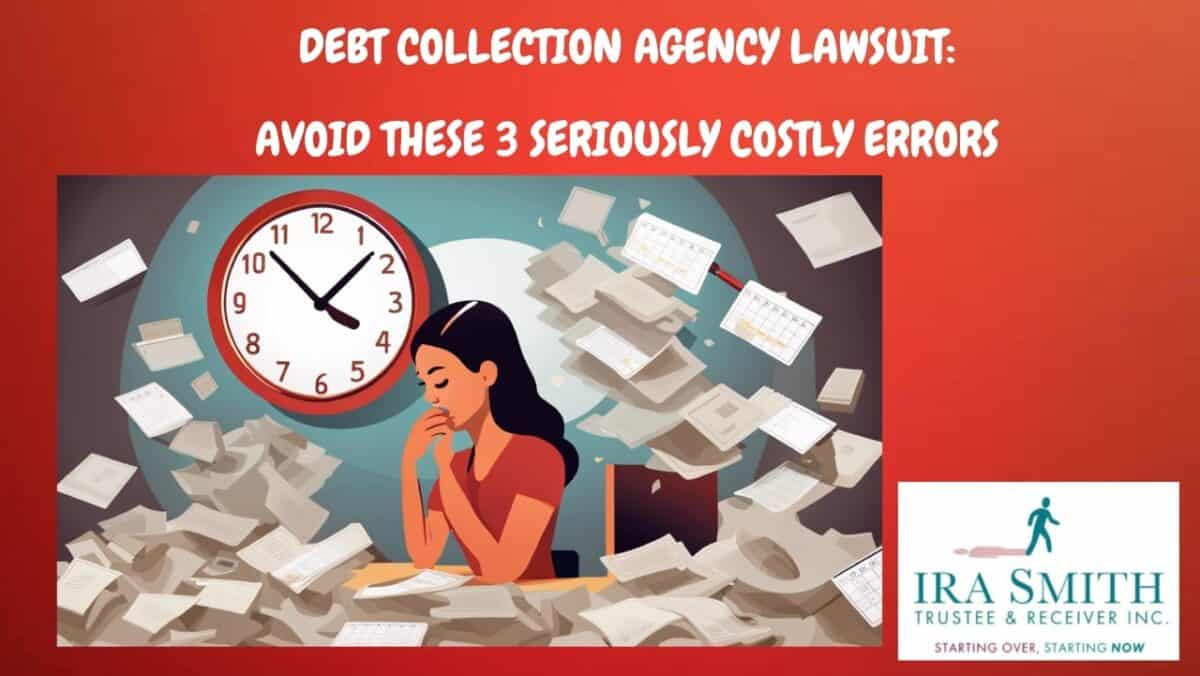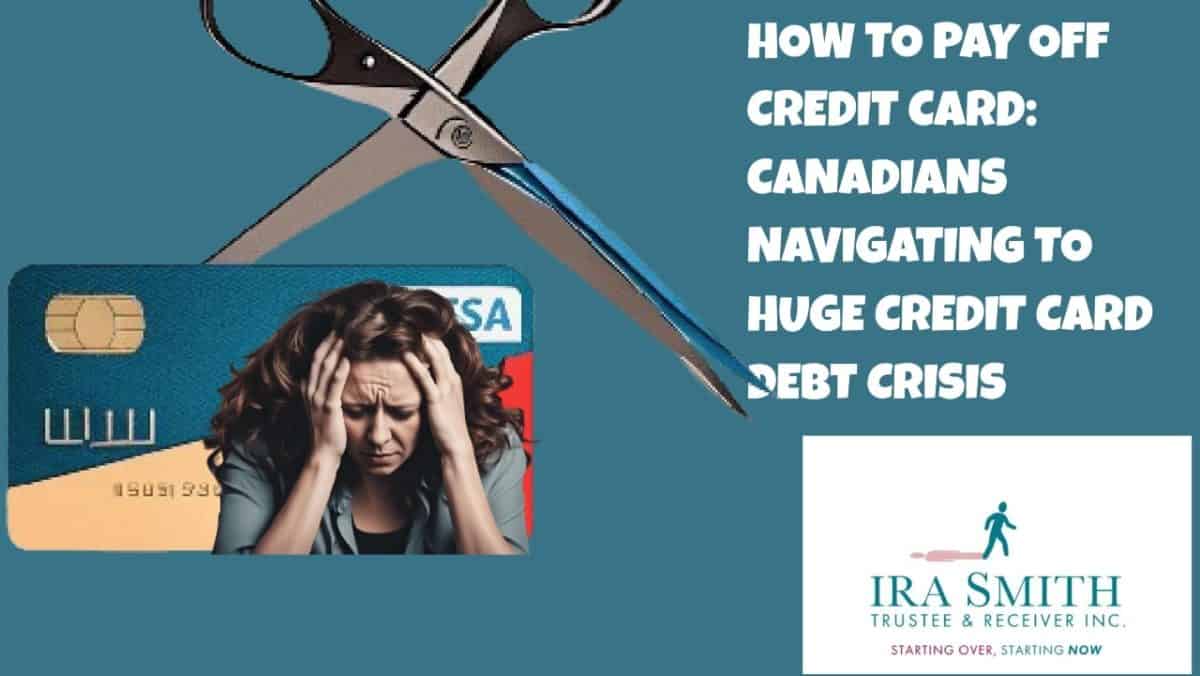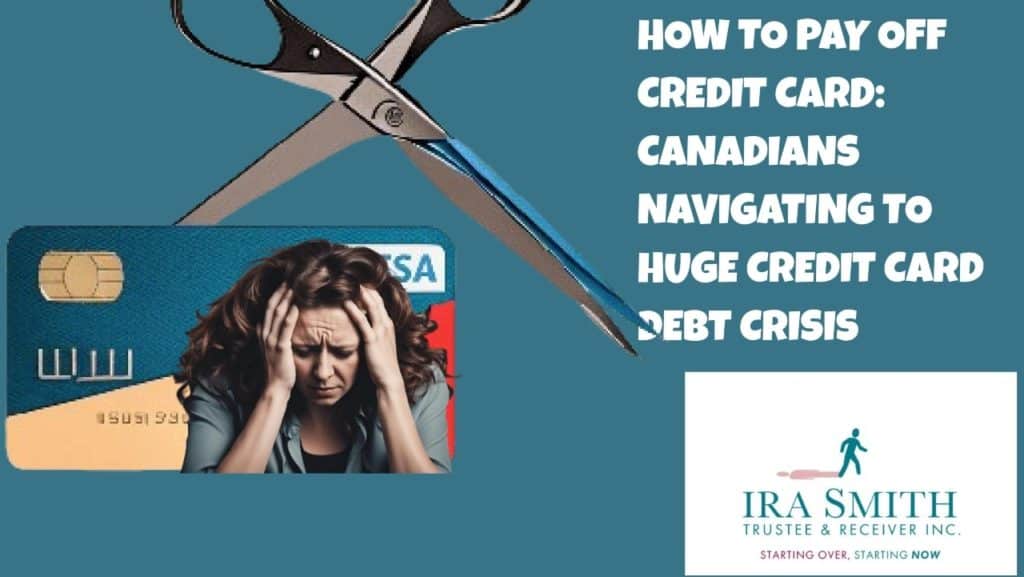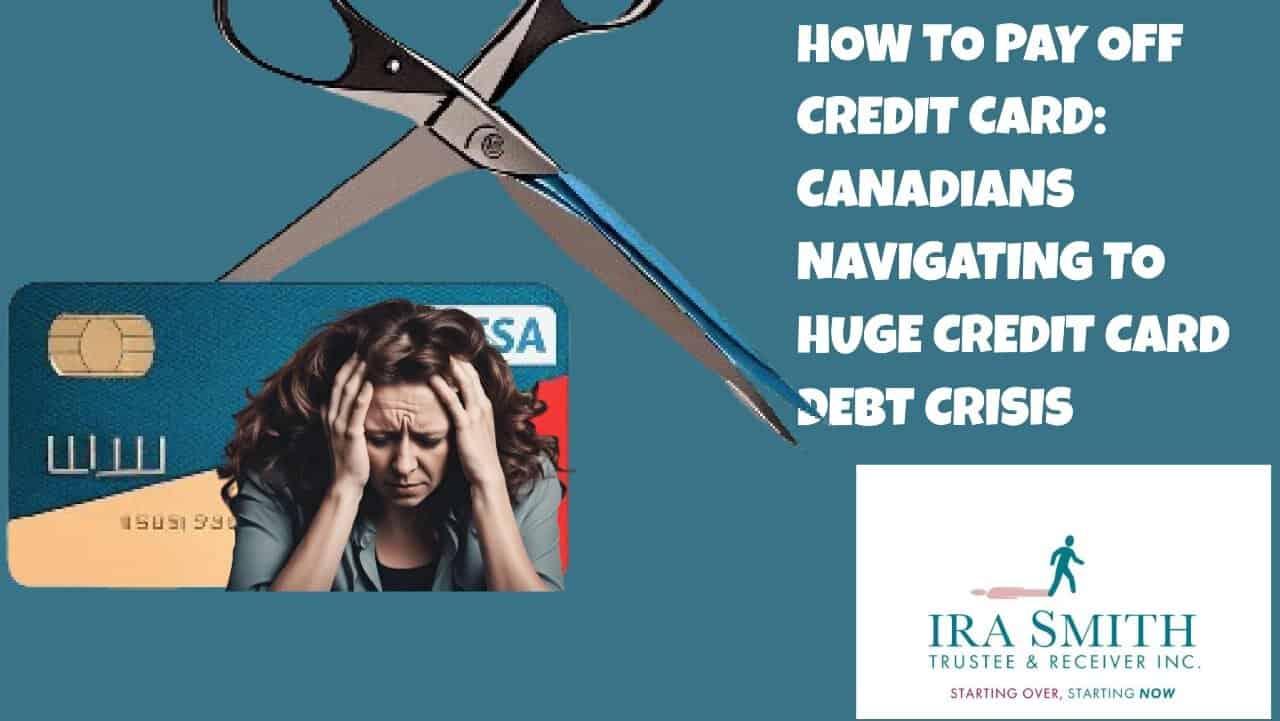Collection Agency Lawsuit: Introduction
As a licensed insolvency trustee, I’ve witnessed the serious effects that a debt collection agency or other creditor lawsuits can have on people and their families. The idea of being sued can feel incredibly daunting, especially when you learn from your lawyer that your chances of winning might not be great. The stress and anxiety that come with being chased by a collection agency can be exhausting, and the fear of receiving a judgment against you can be paralyzing.
However, it’s important to know that you don’t have to face this challenge on your own. Throughout my career, I’ve assisted many individuals and families in navigating the complicated and often stressful world of debt collection lawsuits. Along the way, I’ve identified three common mistakes that can worsen an already difficult situation.
In this post on Brandon’s Blog, I’ll outline these three costly errors that people often make when dealing with debt collection agency lawsuits. Whether you’re currently facing a lawsuit and feeling overwhelmed or just want to be prepared, this information could be vital for you.
Collection Agency Lawsuit: Understanding Ontario’s Debt Collection Regulations
Overview of Ontario laws and practices
The Province of Ontario’s debt collection laws regulating the activities of each collection agency are governed mainly by the Collection and Debt Settlement Services Act, R.S.O. 1990, c. C.14. However, elements of the Consumer Reporting Act, R.S.O. 1990, c. C.33 also come into play. Here’s an overview of the laws and collection practices that every collection agency must follow:
Collection and Debt Settlement Services Act:
- Registration: To provide debt collection agency services, they must be registered with the Province to operate in Ontario and collect outstanding debts on behalf of either the original creditor or themselves if they purchased the debt from the original creditor. To obtain registration, a collection agency must meet certain requirements, such as having a minimum amount of insurance coverage and a designated complaints officer.
- Prohibited Practices: Every Ontario debt collection agency and their collection agents are prohibited from engaging in certain practices, including:
- Using threats, intimidation, or harassment to collect debts
- Making false or misleading representations
- Disclosing confidential information
- Falsifying documents
- Using unfair or deceptive tactics
- Communication: Every collection agency in Ontario must communicate with consumers professionally and respectfully. They must also provide clear and concise information about the debt, including the amount owed, the creditor’s name, and the date the debt was incurred.
- Verification: Each Ontario collection agency must verify the debt before attempting to collect it. This includes confirming the debt with the creditor and ensuring that the consumer is the correct person responsible for the debt.
- Cease and Desist: Consumers can request that a collection agency cease contacting them. The agency must comply with this request and not contact the consumer again unless they have a new debt to collect.
Consumer Reporting Act:
- Credit Reporting: Credit reporting agencies must follow strict guidelines when collecting and reporting consumer credit information. This includes ensuring that the information is accurate, up-to-date, and not used for discriminatory purposes.
- Consumer Rights: Consumers can access their credit report, dispute errors, and request that inaccurate information be removed.
- Data Protection: Credit reporting agencies must protect consumer data by implementing reasonable security measures to prevent unauthorized access, disclosure, or use of the information.
Best Practices for Debt Collection Agency Responsibilities in Ontario
- Compliance: Debt collectors and the collection agency they work for must comply with the laws and regulations outlined above.
- Transparency: Debt collectors must be transparent about the debt, including the amount owed, the creditor’s name, and the date the debt was incurred.
- Professionalism: Debt collectors must communicate with consumers professionally and respectfully and not use coercive language.
- Verification: Debt collectors must verify the debt before attempting to collect it.
- Cease and Desist: Debt collectors must respect consumers’ requests for the collection agency to cease and desist from contacting them.
- Data Protection: Debt collectors and the collection agency they work for must protect consumer data by implementing reasonable security measures.
Penalties for Non-Compliance
- Fines: Any collection agency and all credit reporting agencies that fail to comply with the laws and regulations may be subject to fines.
- License Revocation: A collection agency that fails to comply with the laws and regulations may have its license revoked.
- Criminal Charges: Debt collectors who engage in illegal or unethical practices may be subject to criminal charges.
It’s essential for debt collectors, their collection agency employer and credit reporting agencies to understand and comply with the laws and regulations outlined above to avoid penalties and maintain a positive reputation.
Collection Agency Lawsuits: Understanding the Reality of Debt Collection Lawsuits
As someone who has been closely involved in the world of financial services and recovery, I can tell you that the reality of debt collection lawsuits over unpaid debts is far more prevalent than many people realize. In Canada alone, over 500,000 individuals grapple with such legal challenges every single year. This staggering figure reflects the growing financial struggles that touch nearly every corner of our society. It’s not just a number; it’s a profound reality affecting people’s lives, families, and futures.
Imagine waking up one day to find a statement of claim served upon you. Your heart races, palms sweat, and a whirlwind of anxiety seize you. It’s easy to feel overwhelmed, especially when confronted with the daunting legal jargon and complex processes that accompany a lawsuit. Many of those involved in these situations often feel disheartened, confused, and uncertain about the steps they must take next.
Real-Life Implications of Receiving a Statement of Claim
Let’s unpack what it truly means to be sued after normal collection agency collection efforts are exhausted without success. When you’re served with a court document, it’s not just a piece of paper; it’s a critical juncture in your financial journey. The implications are profound. Ignoring the claim will not magically make it disappear. It almost certainly worsens the situation. Many people mistakenly believe they can sidestep the problem, hoping it will fade away. Trust me, it won’t.
How you respond is vital, and can ultimately shape your financial future. I’ve seen firsthand how a lack of action can lead to disastrous outcomes. If taken lightly, it could lead to a judgment against you, which in turn can result in wage garnishments, frozen bank accounts, or even property liens. The psychological burden of such outcomes is immense, often leading individuals to feel trapped and hopeless.
Common Misconceptions About Debt Handling
One of the most significant misconceptions I often encounter is the belief that simply explaining one’s situation to a judge will lead to a favourable outcome. Unfortunately, reality operates quite differently. Courts have legal frameworks and procedures that must be followed. I’ve seen individuals attempt to represent themselves in court, unaware of the legal nuances that could potentially tip the scales in their favour. This lack of understanding often results in preventable mistakes that can cost dearly in the long run.
Moreover, misconceptions about debt relief options are common. Many people aren’t aware that debt collection lawsuits may present unforeseen opportunities to negotiate settlements or engage in alternate resolutions. An overwhelming percentage of those facing these challenges don’t seek legal assistance—only about one-third take that step. This lack of guidance often leads to missed opportunities for improved financial outcomes.
‘Ignoring debt is like ignoring a fire; it only gets worse over time.’
It’s crucial to dispel these misconceptions. Knowledge is power, and being informed means being better equipped to respond to the challenges debt collection lawsuits pose. It’s essential to reach out for help and understand all available options—taking control of the situation is the first step toward a more secure financial future.
- Seek Professional Guidance: Your law firm experienced in such matters can provide invaluable expertise tailored to your specific situation.
- Understand Your Rights: Knowing what legal protections you have can significantly influence your case.
- Consider Debt Relief Options: Programs like consumer proposals or bankruptcy may offer a strategic path to recovery.
Ultimately, if you find yourself facing a debt collection lawsuit, remember that you’re not alone. The road ahead may seem daunting, but taking action early on can pave the way toward a brighter financial landscape. Whether it’s having your lawyer in your corner or understanding the options available to you, every effort counts.
As someone who has guided many through similar experiences, I can assure you that empowering yourself with accurate information and support can transform a seemingly dire situation into an opportunity for recovery. Imagine breaking free from the overwhelming pressure of financial strain. Picture a future where you’re no longer burdened by the weight of debt. It can happen, but only if you take that first step today.
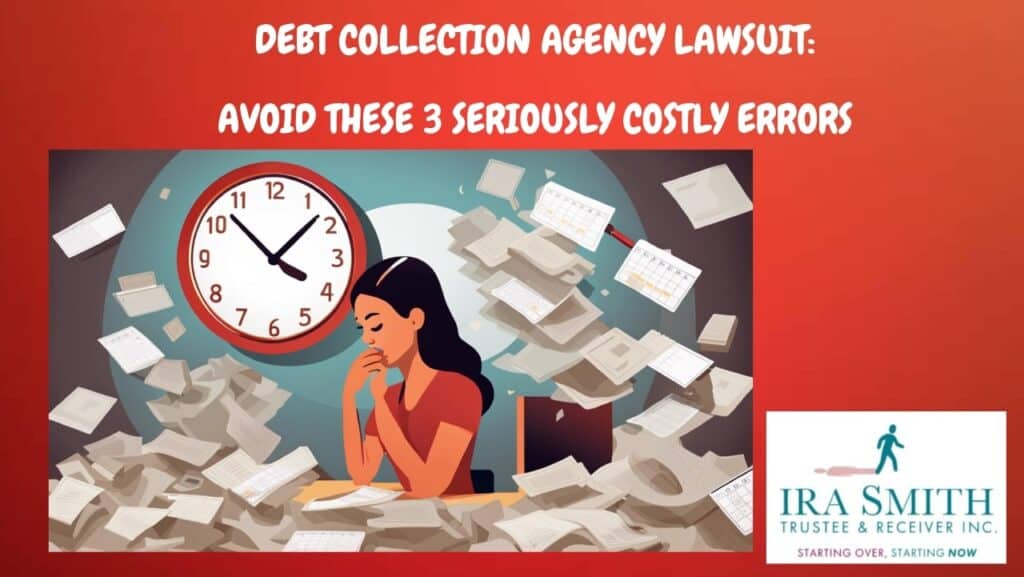
Collection Agency Lawsuit: 3 Critical Errors in Responding to Debt Collection Lawsuits
As someone who has seen countless individuals navigate the turbulent waters of debt collection lawsuits, I can assure you that how you respond can profoundly impact your financial future. It’s not merely about settling scores; it’s about preserving your well-being and financial stability. Allow me to share some critical errors that can lead to catastrophic consequences and how to avoid them.
Understanding the Importance of Timely Responses
Let’s start with the most pressing point: the significance of responding promptly to a debt collection lawsuit. Imagine receiving a claim; your heart races and panic sets in. Many people think they can buy themselves time by delaying their response. However, this is a dangerous miscalculation. Inaction can lead directly to a default judgment, which means the court automatically rules against you simply because you failed to respond.
According to legal statistics, late responses can significantly jeopardize your case and lead to repercussions like wage garnishments and asset seizures. When you fail to respond in time, it’s not just a missed opportunity—it can spiral out of control, making your situation far more difficult than it needs to be. Timing is everything, and knowing when to act could make all the difference.
Consequences of Admitting Debt Too Soon
It’s important to be cautious when it comes to admitting the alleged debt, especially before you’ve fully assessed your situation. Many people, feeling overwhelmed, might quickly agree that they owe the amount claimed in a lawsuit without considering their options. This premature admission can severely limit your ability to negotiate and may cause you to overlook potential defenses that could work in your favor.
For instance, there might be errors in the amount owed, or the creditor might not even have the legal right to pursue the claim against you. I’ve seen many individuals inadvertently close off avenues for resolution just by admitting guilt too soon.
Before you make any statements about your debt, it’s vital to have a clear strategy. The potential consequences are significant—one misstep can put everything you’ve worked for at risk. It’s wise to consult with a legal expert who can help identify possible defences and negotiate on your behalf.
The Risks of Self-Representation
It’s important to understand that admitting to a debt too quickly can have serious consequences. Many people, feeling pressured and overwhelmed, might simply agree to the amount claimed in a lawsuit without fully considering their options. This can significantly reduce your chances for negotiation and might even forfeit defenses you didn’t know you had. For example, there could be errors in the amount owed, or the creditor might not even have the right to pursue the debt.
I’ve seen too many individuals inadvertently close off potential solutions by rushing to admit fault. Before making any statements about your debt, it’s vital to have a clear strategy in place. The implications of a hasty admission can be severe and could jeopardize everything you’ve worked hard for. Consulting with a legal professional is key—they can help identify possible defenses and negotiate on your behalf.
‘The stakes are high – one error can jeopardize everything you’ve worked for.’
The Emotional Toll of Mishandling Lawsuits
It’s vital to recognize that the consequences of mismanaging a debt collection lawsuit stretch beyond just financial implications. The stress that accompanies relentless creditor calls and the looming shadow of a court judgment can take an emotional toll that affects your relationships and overall well-being.
Many people underestimate how overwhelming financial troubles can be. The shame of facing a lawsuit can lead to feelings of isolation and anxiety, which are detrimental to both mental and physical health. I’ve spoken to individuals who felt like their lives were unravelling—caught in a cycle of fear, worry, and self-blame. It’s utterly exhausting and can drain your spirit.
Final Thoughts on Making Informed Decisions
Recognizing these three common mistakes when dealing with debt collection lawsuits is an important step in regaining control of your financial situation. By understanding the need to respond promptly, avoiding early admissions of guilt, and not going it alone without legal help, you can significantly improve your chances of achieving a better outcome.
Seeking professional advice can help you take charge of your financial future. Whether you need legal representation or are considering bankruptcy options, the most important thing is to take informed steps. Remember, being knowledgeable about your rights and options can be your biggest advantage during this difficult time.
Collection Agency Lawsuit: The Emotional and Financial Toll of Mishandling Lawsuits
As someone who has witnessed the devastating impacts of people who default on their monthly payment obligations and mishandling debt collection lawsuits, I can tell you that the fallout goes beyond just the immediate financial consequences. The reality is that when a lawsuit is mishandled, it triggers a domino effect that can alter one’s life in unimaginable ways. Let’s delve into the layers of this issue—looking not just at the financial repercussions but also the profound emotional toll it can take.
Immediate Financial Repercussions
When a debt collection lawsuit is mishandled, the financial ramifications are swift and serious. I’ve seen firsthand how beautiful dreams of financial freedom can turn into nightmares almost overnight. Many individuals underestimate the severity of a judgment against them, thinking it might not be a big deal. Unfortunately, the implications are significant. Once a court issues a judgment, the total debt amount, often much larger than the original loan due to accruing interest and legal fees, is now your responsibility. Not only are you stuck paying back the debt, but you might also be faced with additional costs.
Moreover, judgments can linger on credit reports for as much as seven years. If you’ve ever had to navigate the world of loans, mortgages, or even renting an apartment, you know how crucial a good credit score is to your financial viability. A low score may bar you from access to future loans or significant purchases—plummeting your chances of achieving goals you may have set for yourself. I’ve seen good people get turned down for jobs simply because of what’s on their credit report.
Long-term Impacts on Credit Scores
What I find incredibly frustrating is that the impact of a mishandled lawsuit doesn’t just end when you pay off your debt, if you can. The repercussions can echo into your future, overshadowing your financial landscape for years. The stain of a poor credit report and credit score isn’t easy to wash away, and the road to recovery can be long and winding. Financial institutions such as banks, credit unions and credit card companies rely heavily on credit scores when assessing new credit applications.
If you find yourself in a situation where a lawsuit leads to a judgment against you, the aftershocks can be felt in your credit score for years, creating barriers to financial opportunities that are vital for a secure future.
- A judgment can impact your ability to rent a home.
- It may hinder future loan applications or result in unfavourable interest rates.
- It can limit your job prospects, as some employers check credit history during hiring.
As I mentioned earlier, the emotional struggle that accompanies these financial burdens is often overlooked. It’s vital not to underestimate how these experiences can impact your psyche. How many of you have felt that pit in your stomach when you see a creditor’s name pop up on your phone? It’s more common than you think.
The Overlooked Emotional Toll
As I walk alongside individuals facing debt collection lawsuits, I frequently notice how deeply these situations affect mental wellness. It’s not just about the debt; it becomes a stress point in every aspect of life. Stress manifests in various ways—relationship strains, health problems, and even long-term psychological effects. I know people who have faced sleepless nights filled with anxiety, worrying about unseen threats to their financial stability.
Just ask yourself: how would you feel knowing that a part of your hard-earned income is about to be garnished due to a court judgment? The feeling can be suffocating. It’s like standing on a precipice, staring down at the potential of losing everything you’ve worked so hard to maintain. And the isolation can be crippling. The shame associated with financial struggles can cut you off from support networks, making it harder to seek help when you need it most.
‘The emotional impact can be just as crippling as the financial one.’
Amidst all this, people often miss out on chances to negotiate more favourable terms or explore debt relief options. If only there were better guidance available, less hope would be lost when faced with such legal hurdles. I often reflect on the countless individuals who, due to misinformation and fear, missed out on opportunities for financial redemption.
To sum it up, mishandling a debt collection lawsuit can plunge you into a cesspool of financial instability and emotional turmoil. I’ve seen it wear people down, affecting their relationships, their health, and their overall quality of life. Once you find yourself in the whirlwind of a lawsuit, it’s crucial to tackle it head-on, seeking the right guidance and understanding the full scope of what’s at stake.

Collection Agency Lawsuit: Empower Your Financial Future: Steps to Take Now
As someone who’s seen countless individuals struggle with their finances, I cannot stress enough the importance of taking proactive steps toward achieving financial stability. Many people find themselves in overwhelming debt situations, and I often find that the best move is to seek professional guidance. This is not just a recommendation; it can truly be a lifeline in navigating these stormy waters.
In my interactions with clients, I’ve learned that many overlook the various options available to them in the face of insolvency challenges. Interestingly, seeking the help of a licensed insolvency trustee can illuminate paths they never considered. For instance, options like consumer proposals can be immensely beneficial, potentially leading to substantial debt reduction. These structured exits can alleviate the stresses of overwhelming debts without the burden of a lawsuit lingering over your head.
“Knowledge is power, and understanding your rights is the first step to taking control.”
Taking swift action can not only help you avoid the escalation of financial issues but also open doors for negotiation or resolution. The earlier you either confront the debt or seek help, the more options you have at your disposal.
Exploring Alternative Debt Management Strategies
Don’t underestimate the variety of avenues available to tackle your debt. While some may view bankruptcy as a daunting final resort, it offers legal protection against multiple and persistent creditor lawsuits. It’s vital to recognize that filing for bankruptcy or opting for a consumer proposal can pave the way for a fresh start. These strategies protect you from aggressive creditors, helping to secure your financial future.
I frequently advise my clients to consider all possible alternatives when managing debt. Engaging a licensed insolvency trustee can reveal insights into your specific situation and highlight options that not only aid in immediate debt relief but also help in rebuilding your creditworthiness in the long run.
The Path Towards Financial Recovery
Recovering financially is not just about resolving debts; it’s about reclaiming your financial future. Think about it: having a clear road map can give you peace of mind and remove layers of stress caused by those constant calls from creditors. I often ask my clients to imagine what life would feel like free from the worry of financial pitfalls, and that image often serves as motivation to take the necessary steps forward.
Sometimes, the biggest hurdle is the fear of the unknown. If you’re reading this because you’re feeling overwhelmed, know that there is a way out. Having someone like me or my trusted colleague, Brandon Smith, by your side could mean the difference between continuing down a precarious financial path or stepping toward recovery.
Taking Action: Your Proactive Steps
Now, let’s get practical. Here are key actions you can take:
- Consult with an expert: Reach out to a legal professional who specializes in debt management to get a realistic opinion on the lawsuits facing you.
- Explore other options: Contact a licensed insolvency trustee to learn about consumer proposals, bankruptcy, and other debt management strategies suitable for your situation. We have a very high success rate in consumer proposals.
- Act swiftly: Don’t wait for the situation to worsen before seeking help; early intervention can be invaluable.
At the end of the day, it’s about recognizing that you are not alone in this. There are resources and people ready to help. When you reach out for assistance, you take the first step toward stability and financial empowerment. Remember, it does not have to be this way. There is hope for a brighter financial future, and with the right guidance, you can regain control over your financial destiny.
In summary, by seeking professional guidance and educating yourself on debt management options, you can chart a path toward financial recovery. Don’t let the weight of financial stress hold you back—take action today. Your future self will thank you for it!
Collection Agency Lawsuit: Conclusion
The bottom line is that you need to seek professional help to navigate debt challenges and challenging financial circumstances; explore options like consumer proposals or bankruptcy to regain control if the chances of success in winning your lawsuits are slim or dim. Early action is crucial for financial recovery and peace of mind.
I hope you enjoyed this collection agency lawsuit Brandon’s Blog. Do you or your company have too much debt? Are you or your company in need of financial restructuring due to distressed real estate or other reasons? The financial restructuring process is complex. The Ira Smith Team understands how to do a complex restructuring. However, more importantly, we understand the needs of the entrepreneur or someone with too much personal debt.
You are worried because you are facing significant financial challenges. It is not your fault that you are in this situation. You have been only shown the old ways that do not work anymore. The Ira Smith Team uses new modern ways to get you out of your debt troubles while avoiding bankruptcy. We can get you debt relief freedom.
The stress placed upon you is huge. We understand your pain points. We look at your entire situation and devise a strategy that is as unique as you and your problems; financial and emotional. The way we take the load off of your shoulders and devise a plan, we know that we can help you.
We know that people facing financial problems need a realistic lifeline. There is no “one solution fits all” approach with the Ira Smith Team.
That is why we can develop a restructuring process as unique as the financial problems and pain you are facing. If any of this sounds familiar to you and you are serious about finding a solution, contact the Ira Smith Trustee & Receiver Inc. team today.
Call us now for a free consultation. We will get you or your company back on the road to healthy stress-free operations and recover from the pain points in your life, Starting Over, Starting Now.
The information provided in this Brandon’s Blog is intended for educational purposes only. It is not intended to constitute legal, financial, or professional advice. Readers are encouraged to seek professional advice regarding their specific situations. The content of this Brandon’s Blog should not be relied upon as a substitute for professional guidance or consultation. The author, Ira Smith Trustee & Receiver Inc. as well as any contributors to this Brandon’s Blog, do not assume any liability for any loss or damage resulting from reliance on the information provided herein.
